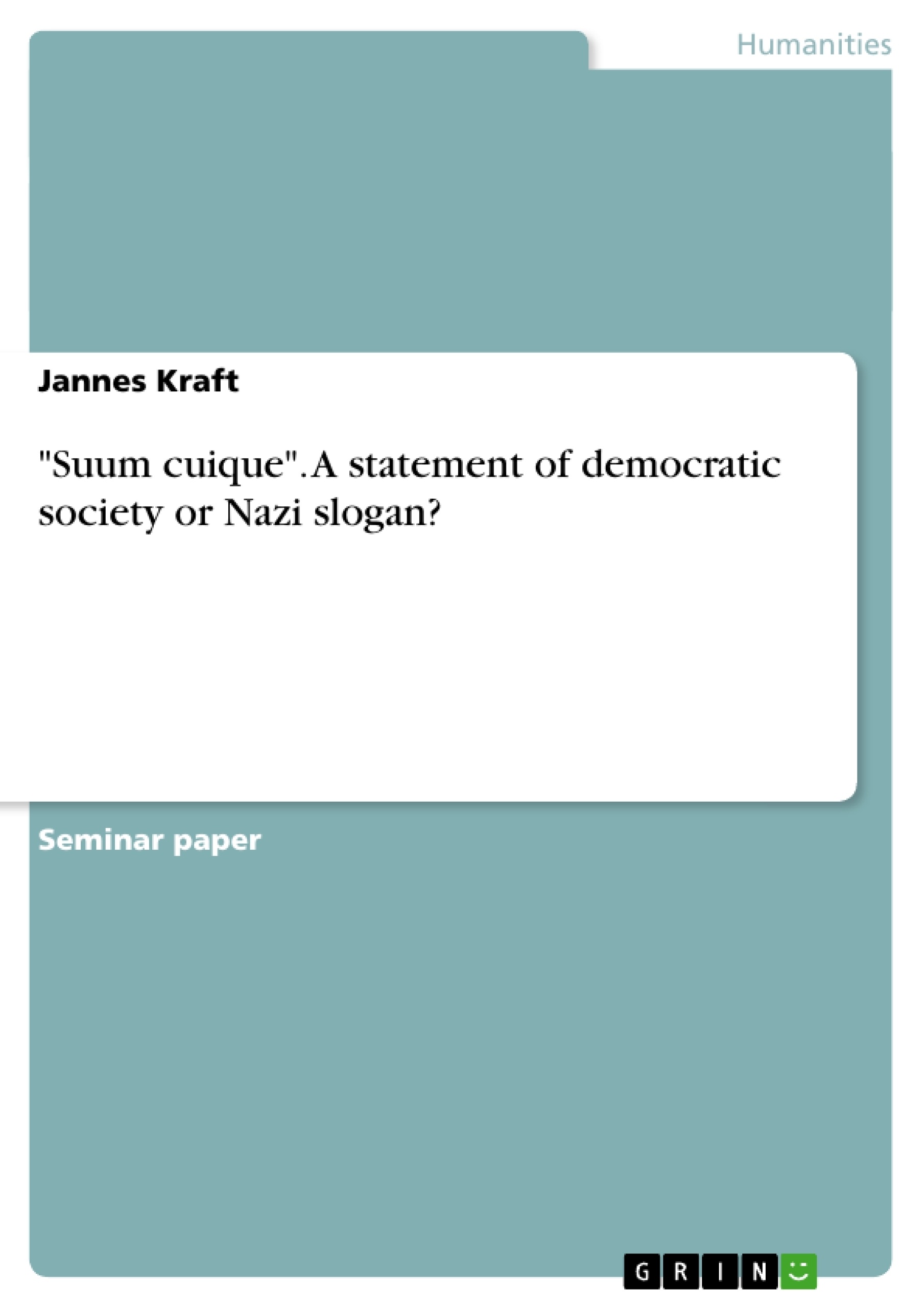This Latin phrase was frequently used as well as abused in the past. For some it is the basis of any democratic society, while others remind us that the Nazis placed it over the entrance gate of Buchendwald concentration camp.
So are we still allowed to quote and use it today? If not, why? And if yes, how?
Table of Contents
- Introduction
- Theoretical Part
- Socrates / Plato
- Aristotle
- Immanuel Kant
- Rawls
- "Suum Cuique" During the National Socialism in Germany
- Conclusion
Objectives and Key Themes
This essay aims to provide an overview of different philosophical perspectives on justice, focusing on the concept of "suum cuique" ("to each his own"). It explores how this phrase has been interpreted and utilized throughout history, examining both its positive and negative applications. The essay also considers the contemporary relevance and ethical implications of using this phrase.
- The historical evolution of the concept of "suum cuique."
- Philosophical interpretations of justice by Socrates, Plato, Aristotle, Kant, and Rawls.
- The application and misuse of "suum cuique" in different historical contexts.
- The ethical considerations surrounding the use of "suum cuique" in modern society.
- The question of whether "suum cuique" is applicable in contemporary times.
Chapter Summaries
Introduction: This introductory chapter establishes the central theme of the essay: the long-standing and multifaceted usage of the phrase "suum cuique," particularly in relation to the concept of justice. It introduces the historical context of the phrase, tracing its origins back to Ulpian's Corpus Iuris Civilis and highlighting its diverse interpretations and applications across various eras. The chapter outlines the essay's structure and objectives, emphasizing its exploration of selected philosophical theories of justice, a historical overview of the slogan’s use, and a final analysis of its contemporary relevance and ethical implications, particularly in light of its controversial use in the past. The introduction sets the stage for a comprehensive investigation into the multifaceted nature of "suum cuique" and its ongoing significance.
Theoretical Part: This section delves into the theoretical underpinnings of justice as understood by various prominent philosophers. It begins by exploring the interpretations of Socrates and Plato, emphasizing the importance of acting justly within a society to achieve individual and societal happiness. The chapter further details Plato's concept of an ideal state founded on four cardinal virtues—wisdom, courage, moderation, and justice—with justice emerging as a consequence of the harmonious integration of the other three. It also delves into Plato's "Idiopragie-Prinzip," contrasting it with a common understanding of "suum cuique." The section continues by presenting Aristotle’s perspective on justice, drawing on his Nicomachean Ethics. Aristotle's view emphasizes justice as a virtue, essential for the well-being of the polis, and considers the concept of “suum cuique” as related to the lawful possession of property. It concludes with a discussion of Immanuel Kant’s perspective on justice and the ethical implications of "suum cuique" as it relates to universal law. Rawls’ theory of justice as achieved through a social contract in an idealized state of ignorance is also discussed, contrasting it with the other perspectives presented.
Keywords
Justice, "suum cuique," Plato, Aristotle, Kant, Rawls, ethics, political philosophy, social justice, historical context, contemporary relevance, ethical implications.
Frequently Asked Questions: A Comprehensive Language Preview
What is the main topic of this essay?
The essay focuses on the concept of "suum cuique" ("to each his own") and its multifaceted interpretations and applications throughout history, particularly in relation to justice.
What are the key themes explored in the essay?
Key themes include the historical evolution of "suum cuique," philosophical interpretations of justice by prominent thinkers (Socrates, Plato, Aristotle, Kant, and Rawls), the application and misuse of the phrase in different historical contexts, and the ethical considerations surrounding its use in modern society. The essay also questions the applicability of "suum cuique" in contemporary times.
Which philosophers are discussed in the essay?
The essay examines the perspectives of Socrates, Plato, Aristotle, Immanuel Kant, and John Rawls on justice and how their ideas relate to the concept of "suum cuique."
How does the essay analyze "suum cuique"?
The essay analyzes "suum cuique" by exploring its historical development, tracing its origins and diverse interpretations across different eras. It examines both its positive and negative applications, and considers its ethical implications in various contexts, including its controversial use during National Socialism in Germany.
What is the structure of the essay?
The essay is structured into an introduction, a theoretical part, and a conclusion. The theoretical part delves into the philosophical perspectives of Socrates, Plato, Aristotle, Kant, and Rawls on justice and "suum cuique". The introduction sets the stage by outlining the historical context and objectives, while the conclusion synthesizes the findings and addresses the contemporary relevance of the topic.
What is the purpose of the chapter summaries?
The chapter summaries provide a concise overview of the content and key arguments presented in each section of the essay, offering a roadmap for understanding the overall thesis and its development.
What are the key takeaways from the essay?
The essay highlights the complexities and ambiguities inherent in the concept of "suum cuique," demonstrating its varying interpretations and applications throughout history. It emphasizes the importance of considering the ethical implications and potential for misuse of such a seemingly straightforward principle in the pursuit of justice.
What are the keywords associated with this essay?
Keywords include: Justice, "suum cuique," Plato, Aristotle, Kant, Rawls, ethics, political philosophy, social justice, historical context, contemporary relevance, ethical implications.
What is the intended audience for this essay?
The essay is intended for an academic audience interested in philosophy, political theory, and the historical context of justice. The detailed analysis and references to specific philosophical concepts suggest a readership with prior knowledge in these areas.
- Quote paper
- Jannes Kraft (Author), 2012, "Suum cuique". A statement of democratic society or Nazi slogan?, Munich, GRIN Verlag, https://www.grin.com/document/195551




